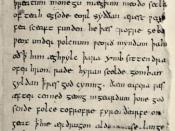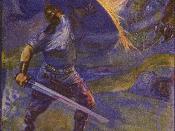"Good vs. Evil" in Beowulf
Beowulf is longest and greatest early Anglo-Saxon poem which was composed in England sometime in the eighth century AD by a literate scop. This poem was created in the oral poetic tradition. This poem is considered as an epic because it is a long narrative poem which composed in an elevated style, dealing with the glories of hero (Tolkien 24). The setting of this epic is the six century in Denmark and southern Sweden. The protagonist, Beowulf is a noble warrior represents the goodness battles against the evil monsters- Grendel, Grendel's mother and the fiery dragon in order to save his country. Beowulf's victory over Grendel and his mother shows the power of goodness can defeat the evil forces. Even though Beowulf is killed by the dragon in the end, his heroic death fulfills with courage and glory. He is selfless, even sacrifice himself in order to save his people's lives; he is loyal to his kingdom all his life (Niles 89).
His triumph of glory exposes the major theme of the epic. A major them in Beowulf is "Good vs. Evil" because the warrior Beowulf battles against God' enemies in order to save God's people.
Beowulf kills Grendel and becomes a noble hero. The first monster Grendel, "a walker of darkness, he who bides in darkness and the black nights; he is the greatest of the night's evil" (Halverson 100). Grendel is descended from Cain who has been banished by God far from humankind settles the wilderness after his crime of murdering his brother (Magennis 123). Grendel is a "joyless den" (Halverson 100); he is jealous of the happiness in the noble place, hall Heorot; therefore, his hatred drives him to attack the heroic society as a rejection of God.


